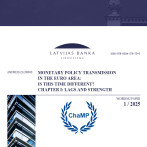Money supply posts seasonally fast growth in December
In December 2010 the growth of the volume of money in circulation continued, reaching the highest monthly growth since December of the previous year. The money indicator M3 of the amount of cash and non-cash currency in the economy grew 3.5% in a month. The rapid growth was largely on account of the seasonality factor, and the M3 annual growth rate even moderated a little, reaching 11.5%.
The December money supply was substantially stimulated by the seasonally high level of state budget expenditure and deficit, increasing the balances in both business and household bank accounts. The growth in production and exports as well as the growing household consumption, which may have been stimulated by the expected rise in consumer taxes, also had a positive effect on business deposits. As a result, the total amount of domestic deposits increased 4.3% in the last month of the year, with the business share (+6.7%) substantially exceeding the household one (+2.2%). The increase in deposits however did not imply that a savings trend was taking hold for it was only the liquid overnight deposit segment that grew along with the demand for cash currency whereas household time deposits even shrank.
The long observed lending shrinkage trend continued in December –the balance of domestic loans was down 1.6% while the annual drop in lending reached 8.3%. The banks showed more caution regarding businesses – the balance of loans granted to them dropped 2.4%, while that of loans to households was down a mere 0.5%, with the balance of consumer credit slightly up reflecting the rise in consumer expenditures.
The subsequent months, particularly January, may post a seasonal drop in money indicators, which may possibly be exacerbated by weakening consumption as the raised tax rates come into effect. The fiscal influence on the money supply could also be less pronounced at the beginning of the year. The contradictory trends in demand observed in the euro zone as a result of the public debt crisis and the increase in the tax burden domestically will push back the renewal of competitive demand for loans. At the same time, the increase in the competitiveness of Latvian businesses may stimulate economic activity and loan inflow in some industries.
Textual error
«… …»






